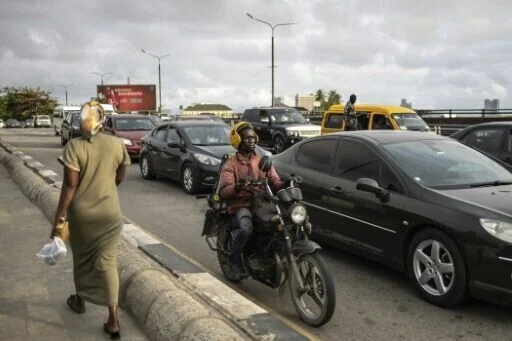Nigeria’s worsening economic crisis and skyrocketing petrol prices have led many to give up their personal vehicles as they struggle with rising living costs.
Bolaji Emmanuel, a 72-year-old retired health worker, is among those who have abandoned his car in favor of public transportation.
“I parked my car at my son’s house. I use public transport now,” Emmanuel said. “It’s not convenient, but it’s what the economy demands.”
Since President Bola Tinubu took office in May 2023, petrol prices have surged more than fivefold due to the removal of a long-standing fuel subsidy and the liberalization of the naira currency. These reforms, aimed at reviving Nigeria’s economy and attracting investors, have led to one of the country’s most severe financial crises in decades.

Before the reforms, petrol was priced at around 195 naira per litre. By October 2024, prices in Lagos had soared to at least 998 naira per litre, while in Abuja, residents paid up to 1,030 naira. In other areas, prices have risen as high as 1,300 naira per litre.
The rapid increase in fuel costs has further eroded purchasing power, with inflation peaking at 34.19% in June—its highest in nearly three decades—before slightly easing to 32.7% in September. With more than 40% of the population already living in poverty, the World Bank predicts that this figure will rise through 2024 and 2025.
READ ALSO: Petrol scarcity will be over soon but we have no control over prices – FG
The middle class, which once made up about 20% of the population, has also been forced to cut back, abandoning larger, fuel-consuming vehicles. Car dealers in Lagos and Abuja have reported a growing trend of people trading in SUVs for smaller, more fuel-efficient vehicles to cope with the high petrol prices.
“People are actually selling their big cars these days,” said Maji Abubakar, a car dealer in Abuja. “But even if you put them on the market, there isn’t much demand.”
Tech entrepreneur Elijah Bello from Ogun State is one such example. After months of trying to sell his Lexus RX 350 SUV, he opted for a smaller, energy-efficient Toyota Corolla.
The trend of downsizing vehicles is expected to intensify. Bunmi Bailey, head of research at SBM Intelligence, a risk consultancy, predicted that “we will see fewer cars on the roads” as more people turn to cheaper alternatives.
Some middle-class Nigerians have even turned to bicycles, despite the lack of infrastructure in cities like Lagos. Femi Thomas, head of FT Cycle Care, has noticed a rise in cycling since the fuel price hike, and food delivery platform Glovo reported that about 20% of its deliveries in Nigeria are now being completed by bike.
With the high cost of living pushing more people to abandon their vehicles, Nigeria’s transportation landscape is rapidly evolving, as individuals seek more affordable ways to cope with the economic strain.




